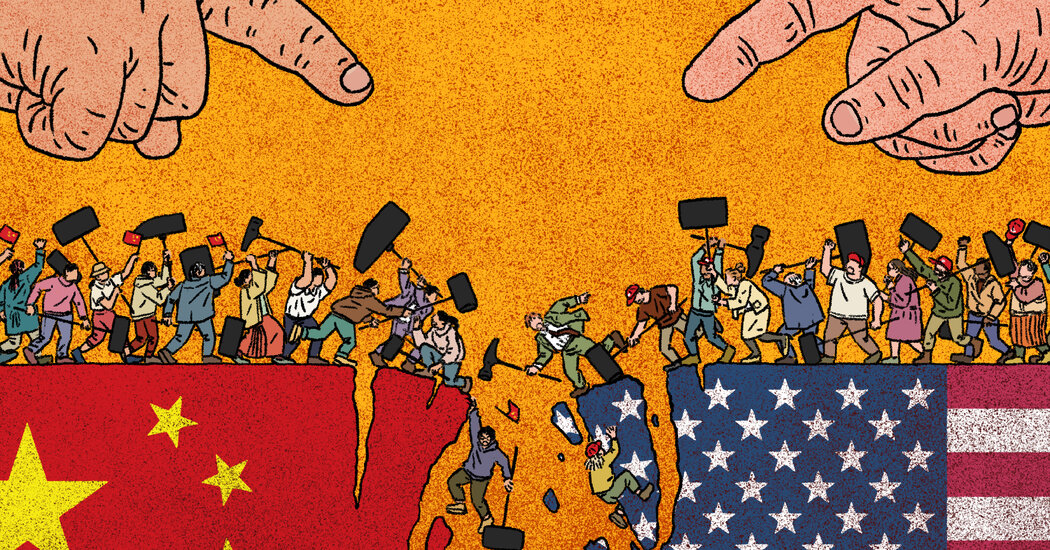Here is the plain text result:
President Trump didn’t seem to mind as his worldwide tariffs set off stock market sell-offs and wiped out trillions of dollars in wealth. “Be cool,” he told Americans. Then he blinked on Wednesday afternoon in the face of financial turmoil, particularly a rapid rise in government bond yields that could shake the dominant position of the dollar and the foundation of the U.S. economy.
By pausing some tariffs for dozens of countries for 90 days, he also gave away something to his main rival, the Chinese leader Xi Jinping, with whom he has engaged in a game of chicken that risks decoupling the world’s two biggest economies and turning the global economic order upside down.
Mr. Xi learned that his adversary has a pain point.
As reckless and ruthless as Mr. Trump may seem to some parts of the world, in Mr. Xi and China he is squaring off with a leader and a party state that have a long history of single-minded pursuit of policies, even when they resulted in economic and human catastrophe.
Among Chinese, a consensus among both Beijing’s critics and its supporters is that the endgame may come down to which leader will be able to make his people endure misery in the name of the national interest.
“Tariffs and even economic sanctions are not Xi Jinping’s pressure points,” Hao Qun, an exiled Chinese novelist who writes under the name Murong Xuecun, wrote on X. “He is not particularly concerned about the hardships tariffs may cause for ordinary people.”
Unlike Mr. Trump, Mr. Xi does not speak to the Chinese public through social media platforms, although he controls all of them. Everything he says and does is choreographed.
Mr. Xi, whom some Chinese view as Mao’s successor to the mantle, likes talking about the benefits of withstanding hardship.
Born in a revolutionary family, Mr. Xi experienced political turmoil and adversity at a young age. His father, a vice premier, was purged when Mr. Xi was 9 years old. During the Cultural Revolution, Mr. Xi’s father was severely persecuted. The son, not yet 16, had to move to a village deep in the Loess Plateau and work as a farmer.
“It was 2023, and China’s economy was struggling to recover from the Covid pandemic. Youth unemployment skyrocketed. Mr. Xi told young people that they should learn to ‘eat bitterness,’ using a colloquial expression that means to endure hardships,”
Early in 2022, it was evident that the Omicron variant was too contagious to contain, but that nearly all other countries that had embraced vaccines were able to reopen their economies. But Mr. Xi insisted that China live through his draconian “zero Covid” measures while resisting importing Western vaccines. Hundreds of millions of people endured lockdowns, daily tests and forced quarantines. Many lives and livelihood were ruined.
Mr. Xi does have a pain point on the economy: He can’t let things get so bad that it jeopardizes the legitimacy of the party’s rule. Nationwide protests in November 2022 helped bring the zero Covid to an end. The tariffs threaten China’s exports, which are driving the country’s economy.
As the world learned this week, Mr. Trump cannot completely ignore the financial markets or the Wall Street and tech billionaires who supported his campaign.
It’s hard to imagine that any Chinese entrepreneurs would dare to do the same or, like Mr. Musk, have the channel to convey their concerns to Mr. Xi, who has pushed aside his political opponents and cracked down on private companies.
I have been checking Chinese social media the past few days hunting for any well-known company or entrepreneur complaining about the trade war. I found none. Ordinary people who lamented online that they faced pay cuts or lost business because of the tariffs were shot down by nationalistic commenters and labeled “unpatriotic.”
That’s a base Mr. Trump can’t compete with. “Submitting to hegemony has never been an option for China,” a Weibo user wrote on Thursday. “If we could kick out the Americans during the Korean War, we have nothing to fear its tariff stick. We must respond with an iron fist.” The comment was liked more than 3,000 times.
Source link




